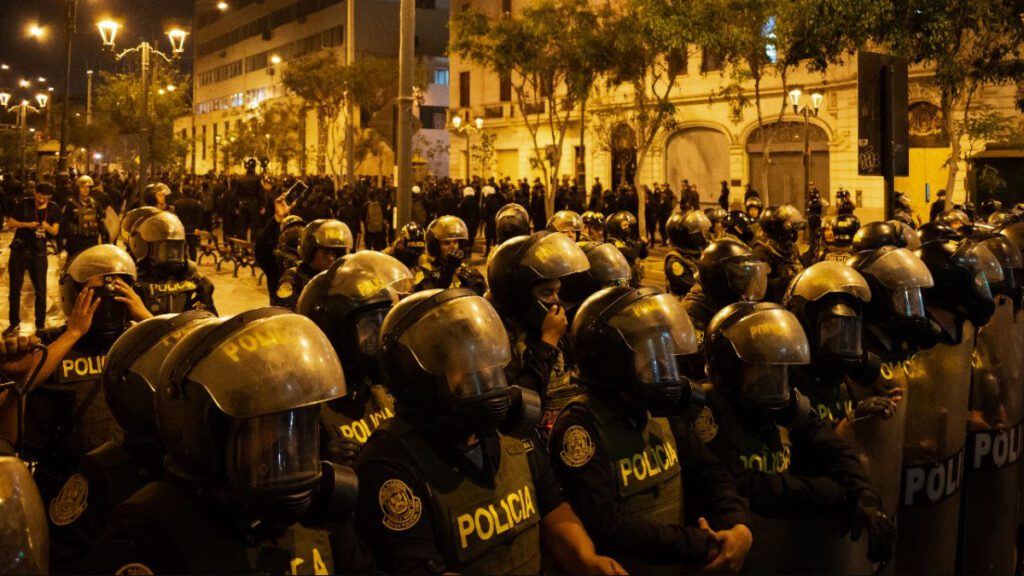By Javier Jahncke, Comisión Episcopal de Acción Social




Peru’s new government imposed an emergency on December 14, 2022, granting extensive powers to the police and suspending many civic rights. This was a response to widespread and often violent protests that had broken out after the dismissal of former president Pedro Castillo.
Hailing from the labour movement, Castillo had sparked much hope in the progressive sector when he narrowly defeated the right-wing Keiko Fujimori in the July 2021 election. However, he soon came to be seen by many as mired in corruption and despotism. He was ousted by lawmakers on December 7, after he tried to circumvent his own impeachment by dissolving Congress, a move that was called a self-coup.
Castillo was replaced by former vice-president Dina Boluarte. Her refusal to call the fresh elections that many are demanding have prompted the intensification of demonstrations. By late last week, this had led to border blockages and the evacuation of tourists. Boluarte has since announced that she will replace the prime minister and reshuffle her cabinet.
Meanwhile, the Episcopal Conference of Peru has condemned the violence and called for peaceful dialogue (see statement in Spanish). The National Coordinator for Human Rights, of which the episcopal conference is a member, has also urged President Boluarte to call elections immediately (see statement in Spanish). With 20 lives already lost to the turmoil, Pope Francis has prayed for peace in Peru.
In this guest editorial, Javier Jahncke reflects on these political events, the pattern they fit into and their wider implications. He counsels his country’s leaders to listen to the people for a change.
Jahncke is a human rights lawyer with the Comisión Episcopal de Acción Social (CEAS, Episcopal Commission for Social Action), a Development and Peace ― Caritas Canada partner organization.
Over the last four months, I have had the opportunity to travel extensively in northern and central Peru and the Amazon region, in the company of many communities and peasant patrols. We also listened to the analyses of pastoral teams across the country. I was left with a lasting impression of surprise when, first, in the middle of a social organizations’ meeting, we heard of former president Pedro Castillo’s “self-coup” and then of his impeachment.
In fact, this surprise reminded me of the surprise with which the political class in Lima and large parts of the population had reacted after Castillo’s election, especially after the first round.
Responding to such surprises, which occur cyclically in our country’s political sphere, requires a change in our individualistic perspective on life whereby we only seek our own wellbeing―the logic imposed and promoted by the corporate media of my getting ahead and nothing else mattering.
This logic ignores what Aguedas’s The Fox From Up Above and the Fox From Down Below1, Alegría’s Broad and Alien is the World2 and the report of the Truth and Reconciliation Commission3 have suggested: that two parallel countries exist within Peru.
The women and men of Peru have been systematically rejected, forgotten, displaced, and considered second-class citizens.
The rural poor are simply treated as servants because they serve as larders to the city. From their territories must come the raw materials for the extractive projects that maintain the country’s economy. “Don’t touch my house and city, but do as you will with theirs,” people seem to think. And when they defend their territories, they are treated as criminals. They are treated as anti-development, when all they―especially, our Indigenous, Andean, Amazonian and coastal communities―want is to maintain their livelihoods, the forest and the ecosystems that capture and generate water in river basin headwaters. They also simply seek respect for their ways of life.
On the one hand, there is talk of progress in human rights, but on the other, Indigenous communities are seeing few advancements. We think of their territories as merchandise. We do not respect their spiritual and cultural relationship with nature, when we should really be concerned about recovering them to protect our common home, as Pope Francis calls us to do in the encyclical Laudato Si’.
I especially mention this because the short-lived Pedro Castillo government has shown that high levels of racism, discrimination and contempt persist among Peruvians with lifestyles of plentiful excess who want to maintain their privileges over the huge numbers who live in poverty, often extreme―the ones whom Pope Francis calls the “discarded” of society.
Another thing we have seen is how corruption is rampant at all levels. Former presidents Fujimori, Toledo, Humala, Kuczynski and now Castillo have been tried or sentenced for corruption. Former president García committed suicide to avoid serving a prison sentence. This corruption comes from all levels. But those who have economic power in the country, who are the de facto power, who manage political power, you can see that none of them serve any sentences. They continue defending their interests with impunity; using their media monopoly; and, as one Peruvian oligarch used to boast, “placing and removing presidents.”
Given all this, we must say that Castillo’s impeachment does not resolve the political crisis, which is structural. Listening to people throughout the country and from the growing social protests, it is evident that for now, what the corporate media are trying to cover up, as they did in Fujimori’s time, is the demand for an early general election.
It is with concern that I hear some people and civil society institutions claiming that President Dina Boluarte will stay in power until 2026, or that some ministers are good. While government must carry on because the country must attend to its needs, it cannot be overlooked that a Congress that is the main cause of the political crisis must be changed as soon as possible. It is a Congress full of economic and private interests, and very far from what the country need. It is clear that it had already reached an agreement with Boluarte to take over the presidency, and that the appointments of many in the new cabinet are part of a political negotiation.
Congress president José Williams and his board of directors know that the discredit in which they are held by the people, which exceeds that of former president Castillo, does not allow them to assume the presidency. This is even more reason why, despite there being no current prospect of new leadership, they cannot turn a deaf ear to the feelings of the people at the national level.
- In his 1971 novel, “The Fox From Up Above and the Fox From Down Below” (El zorro de arriba y el zorro de abajo), Peruvian novelist, poet and anthropologist José María Arguedas critiqued the impact of rapid modernization and urbanization on Indigenous Andean communities.
- In the 1941 novel, “Broad and Alien is the World” (El mundo es ancho y ajeno), journalist-politician Ciro Alegría Bazán described an Indigenous tribe’s struggle for survival in the Peruvian Andes.
- In 2003, Peru’s Truth and Reconciliation Commission reported that up to 77,552 people had been killed and hundreds of thousands had been displaced by internal conflicts through the 1980s and 1990s. It implicated the army, the police and other state agencies of the era’s governments, especially that of Alberto Fujimori, in the bloodshed.

